Related Research Articles

James Benjamin Blish was an American science fiction and fantasy writer. He is best known for his Cities in Flight novels and his series of Star Trek novelizations written with his wife, J. A. Lawrence. His novel A Case of Conscience won the Hugo Award. He is credited with creating the term "gas giant" to refer to large planetary bodies.

Damon Francis Knight was an American science fiction author, editor, and critic. He is the author of "To Serve Man", a 1950 short story adapted for The Twilight Zone. He was married to fellow writer Kate Wilhelm.

Double Star is a science fiction novel by American writer Robert A. Heinlein, first serialized in Astounding Science Fiction and published in hardcover the same year. It received the 1956 Hugo Award for Best Novel.

Richard Georg Strauss was a German composer and conductor best known for his tone poems and operas. Considered a leading composer of the late Romantic and early modern eras, he has been described as a successor of Richard Wagner and Franz Liszt. Along with Gustav Mahler, he represents the late flowering of German Romanticism, in which pioneering subtleties of orchestration are combined with an advanced harmonic style.

The Museum of Pop Culture or MoPOP is a nonprofit museum in Seattle, Washington, United States, dedicated to contemporary popular culture. It was founded by Microsoft co-founder Paul Allen in 2000 as the Experience Music Project. Since then MoPOP has organized dozens of exhibits, 17 of which have toured across the U.S. and internationally.

A narrative, story, or tale is any account of a series of related events or experiences, whether nonfictional or fictional. Narratives can be presented through a sequence of written or spoken words, through still or moving images, or through any combination of these. The word derives from the Latin verb narrare, which is derived from the adjective gnarus. The formal and literary process of constructing a narrative—narration—is one of the four traditional rhetorical modes of discourse, along with argumentation, description, and exposition. This is a somewhat distinct usage from narration in the narrower sense of a commentary used to convey a story. Many additional narrative techniques, particularly literary ones, are used to build and enhance any given story.
In American science fiction of the 1950s and '60s, psionics was a proposed discipline that applied principles of engineering to the study of paranormal or psychic phenomena, such as extrasensory perception, telepathy and psychokinesis. The term is a blend word of psi and the -onics from electronics. The word "psionics" began as, and always remained, a term of art within the science fiction community and—despite the promotional efforts of editor John W. Campbell, Jr.—it never achieved general currency, even among academic parapsychologists. In the years after the term was coined in 1951, it became increasingly evident that no scientific evidence supports the existence of "psionic" abilities.

"The Girl Who Was Plugged In" is a science fiction novella by American writer James Tiptree, Jr. It won the Hugo Award for Best Novella in 1974.
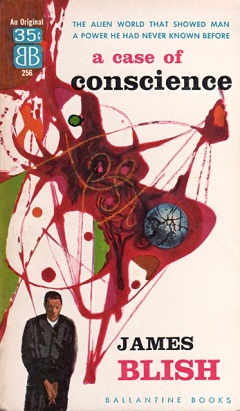
A Case of Conscience is a science fiction novel by American writer James Blish, first published in 1958. It is the story of a Jesuit who investigates an alien race that has no religion yet has a perfect, innate sense of morality, a situation which conflicts with Catholic teaching. The story was originally published as a novella in 1953, and later extended to novel-length, of which the first part is the original novella. The novel is the first part of Blish's thematic After Such Knowledge trilogy and was followed by Doctor Mirabilis and both Black Easter and The Day After Judgment.
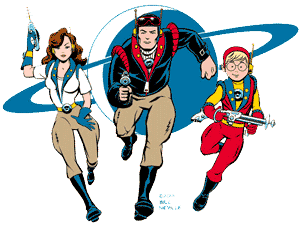
The 62nd World Science Fiction Convention (Worldcon), also known as Noreascon 4, was held on 2–6 September 2004 at the Hynes Convention Center, Sheraton Boston Hotel and Boston Marriott Copley Place in Boston, Massachusetts, United States.
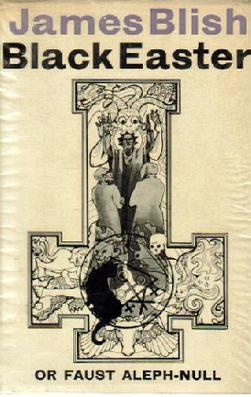
Black Easter is a fantasy novel by American writer James Blish, in which an arms dealer hires a black magician to unleash all the demons of Hell on Earth for a single day. The novel initially depicts the assassination of a Governor of California by a black magician working as a contract killer. The same magician is then hired to release every demon in Hell for a brief time period. However, the demons can not actually return to Hell by the end of the novel. Their traditional opponent, God, has already died and nobody else can compell them to return to Hell.
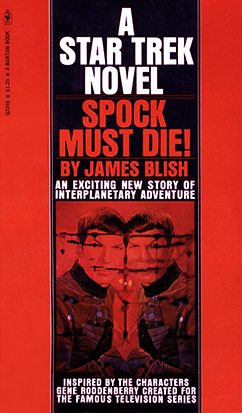
Spock Must Die! is an American science fiction novel written by James Blish, published February 1970 by Bantam Books. It was the first original novel based on the Star Trek television series intended for adult readers. It was preceded by a tie-in comic book line published by Gold Key and the novel Mission to Horatius by Mack Reynolds, all intended for younger readers.

Cities in Flight is a four-volume series of science fiction novels and short stories by American writer James Blish, originally published between 1950 and 1962, which were first known collectively as the "Okie" novels. The series features entire cities that are able to fly through space using an anti-gravity device, the spindizzy. The stories cover roughly two thousand years, from the very near future to the end of the universe. One story, "Earthman, Come Home", won a Retro Hugo Award in 2004 for Best Novelette. Since 1970, the primary edition has been the omnibus volume first published in paperback by Avon Books. Over the years James Blish made many changes to these stories in response to points raised in letters from readers.
Pantropy is a hypothetical process of space habitation or space colonization in which, rather than terraforming other planets or building space habitats suitable for human habitation, humans are modified to be able to thrive in the existing environment. The term was coined by science fiction author James Blish, who wrote a series of short stories based on the idea.
There have been many attempts at defining science fiction. This is a list of definitions that have been offered by authors, editors, critics and fans over the years since science fiction became a genre. Definitions of related terms such as "science fantasy", "speculative fiction", and "fabulation" are included where they are intended as definitions of aspects of science fiction or because they illuminate related definitions—see e.g. Robert Scholes's definitions of "fabulation" and "structural fabulation" below. Some definitions of sub-types of science fiction are included, too; for example see David Ketterer's definition of "philosophically-oriented science fiction". In addition, some definitions are included that define, for example, a science fiction story, rather than science fiction itself, since these also illuminate an underlying definition of science fiction.
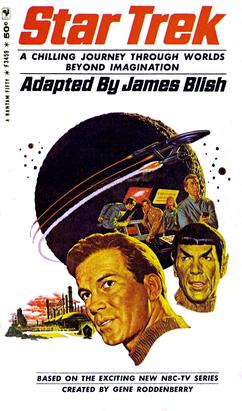
In 1966, Bantam Books acquired the license to publish tie-in fiction based on the science fiction television series Star Trek.
The 12th World Science Fiction Convention (Worldcon), also known as SFCon, was held on 3–6 September 1954 at the Sir Francis Drake Hotel in San Francisco, California, United States.
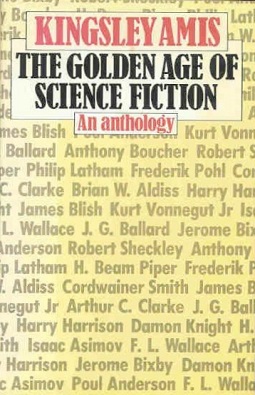
The Golden Age of Science Fiction is an anthology of science fiction short stories all originally published between 1949 and 1962. The stories were selected and introduced by Kingsley Amis, who also wrote an Editor's Note and a 21-page Introduction. The collection was first published by Hutchinson in 1981 and was released in paperback by Penguin in 1983.

In Search of Wonder: Essays on Modern Science Fiction is a collection of critical essays by American writer Damon Knight. Most of the material in the original version of the book was originally published between 1952 and 1955 in various science fiction magazines including Infinity Science Fiction, Original SF Stories, and Future SF. The essays were highly influential, and contributed to Knight's stature as the foremost critic of science fiction of his generation. The book also constitutes an informal record of the "Boom Years" of science fiction from 1950-1955.
Judith Ann Blish is an American sketch artist and short fiction writer, known professionally as Judith L. Blish, Judy Blish, and J. A. Lawrence. From 1967 to 1978, she co-wrote a sequence of short story adaptations based on episodes of Star Trek with her husband, James Blish.
References
- 1 2 Mills, Robert P., ed. (1963). The Worlds of Science Fiction. Paperback Library.
- ↑ Amis, Kingsley, ed. (1981). The Golden Age of Science Fiction. Hutchinson.